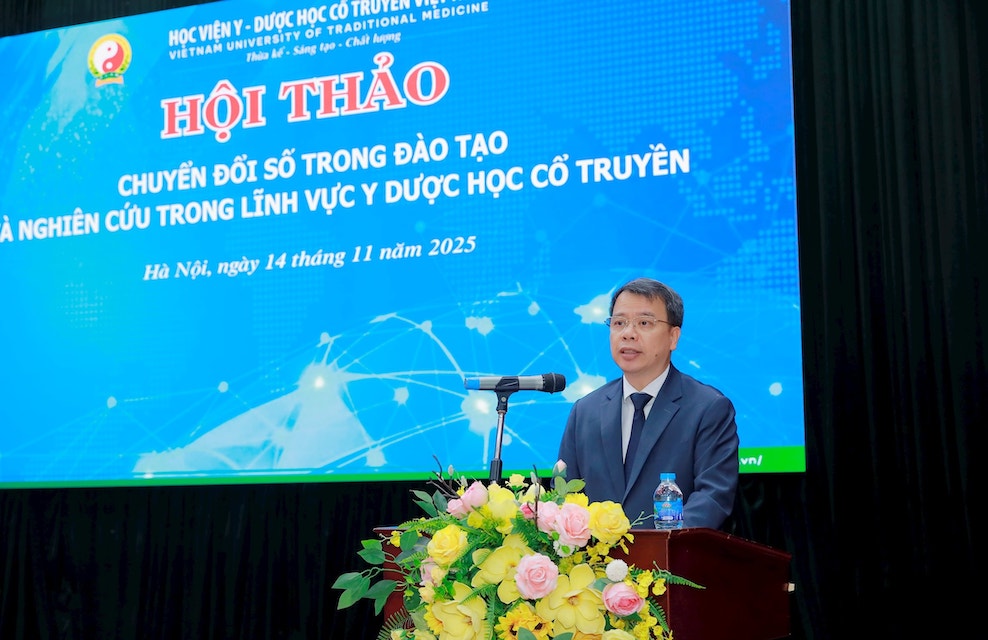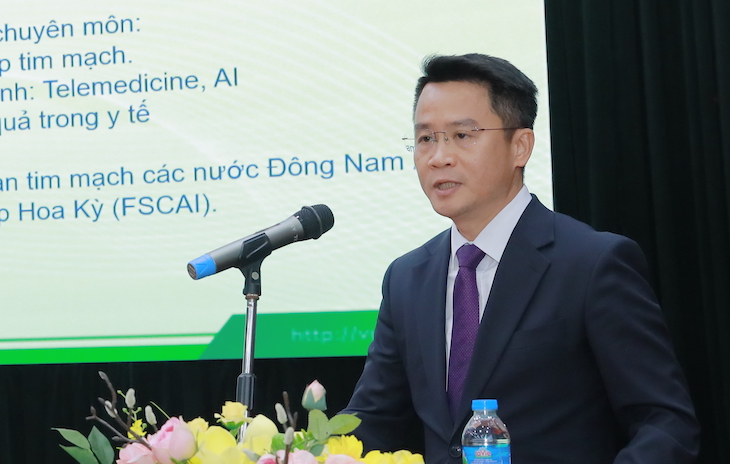On November 14, in Hanoi, the Vietnam Academy of Traditional Medicine and Pharmacy organized a workshop on digital transformation in training and research in the field of traditional medicine and pharmacy.
In his opening speech, Associate Professor, Dr. Nguyen Quoc Huy, Director of the Vietnam Academy of Traditional Medicine and Pharmacy, said that the workshop was held in the context that the whole country is strongly implementing Resolution No. 57 of the Politburo on breakthroughs in the development of science, technology, innovation and national digital transformation.

According to Mr. Huy, for the health sector, this is not only a major policy, but also an inevitable trend of the times, urging innovation in training methods, improving the quality of research and applying technology to serve people's health better and better.
Digital transformation is not simply about equipping with new technology, but a comprehensive innovation process from management, teaching, research to thinking and learning culture - Mr. Huy affirmed.
Speaking at the workshop, Mr. Nguyen Ngo Quang - Director of the Department of Science, Technology and Training, Ministry of Health affirmed that digital transformation is an inevitable trend, cannot be left out, forcing people to approach, learn, adapt, be flexible and especially develop skills related to digital transformation in the coming time.
To deploy and apply digital transformation in various fields, according to Mr. Quang, there are three very important points: Infrastructure, information technology infrastructure; database and ethics in applying and using artificial intelligence (AI) in various fields.
In the report with the theme " applying AI in diagnosis and treatment", Mr. Hoang Viet Anh - Deputy Director of the Center for Quality Management of Medical Examination and Treatment, Deputy Head of the General Planning Department of Bach Mai Hospital said that currently, the first AI hospital in the world is being deployed in China.
AI Hospital will help thousands of patients to be diagnosed and treated every day with almost zero human resources. This is a huge advantage of applying artificial intelligence in disease management and treatment.
From lessons in China, Mr. Viet Anh said that in the context of a shortage of resources and medical human resources in Vietnam, AI can be completely applied, creating opportunities to fill the gap in resources
Citing evidence at the Mackerel Hospital, he said that AI will help manage and collect data. This hospital treats about 4,500 inpatients and daily has from 8,000 to 10,000 outpatients, with about 12 to 14,000 patient records per day.
"Up to now, patients have come and gone, the paperwork has come and been stored in the warehouse. Many students even come to find data but their medical records are dusty.
AI will help patients have a living data warehouse, connect with each other, create an automated process, personalize treatment instead of storing paper records, storing them in warehouses, finding medical records, etc.
However, he also pointed out challenges such as segmented, unstandardized data. Health care data is often sensitive, inconsistent, and segmented, making it difficult to develop modern machine learning algorithms.

The second challenge is data security. The biggest concern is whether AI can leak or disseminate our data. Because medical data and data related to patients are extremely valuable and sensitive resources.
According to Mr. Viet Anh, when putting data into data warehouses or AI models to process and receive useful products back, the question is: Will the data then be leaked or disseminated outside? This is an issue that we need to have a solution from the beginning, right when entering the implementation process, we cannot wait until the incident occurs to handle it, because at that time it will be extremely difficult.
Users must also always be vigilant with AI, because AI will have some bad points, even "AI smart" is fabricating stories, creating fake data and reference documents...
If we rely on AI, invisibly, we will provide incorrect treatments, regimens, and remedies, which are even dangerous, Mr. Viet Anh added about the challenges in applying AI.
Therefore, he emphasized that AI must always be considered a supporter and a supporting device. AI will not be able to replace humans but only support us to do more things.











